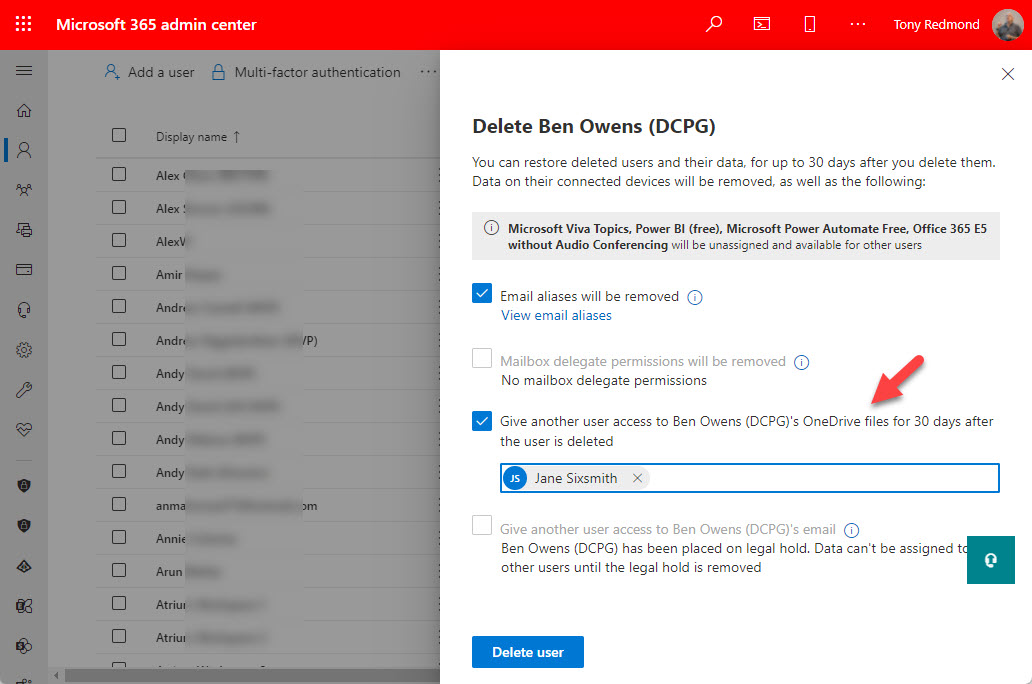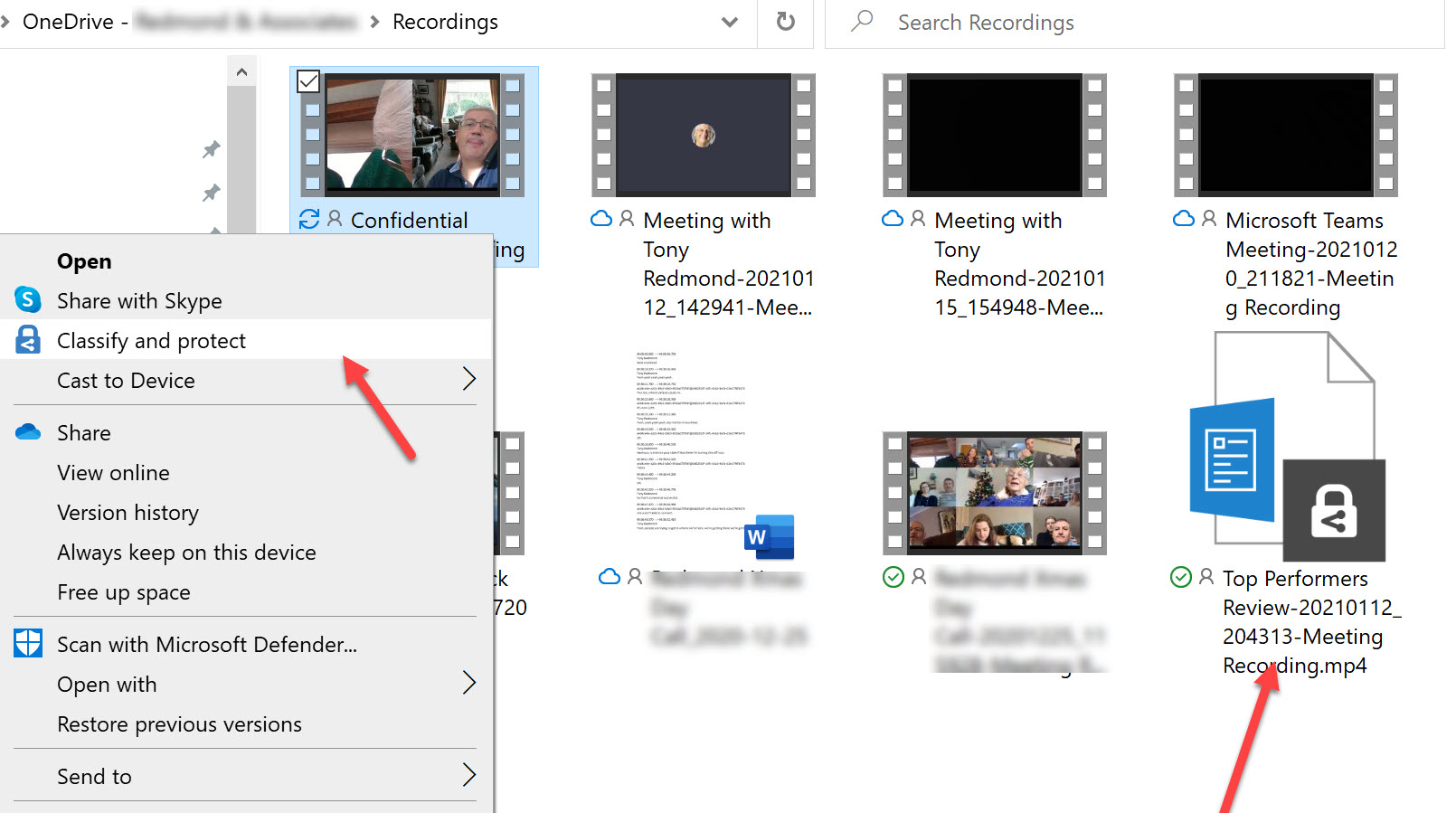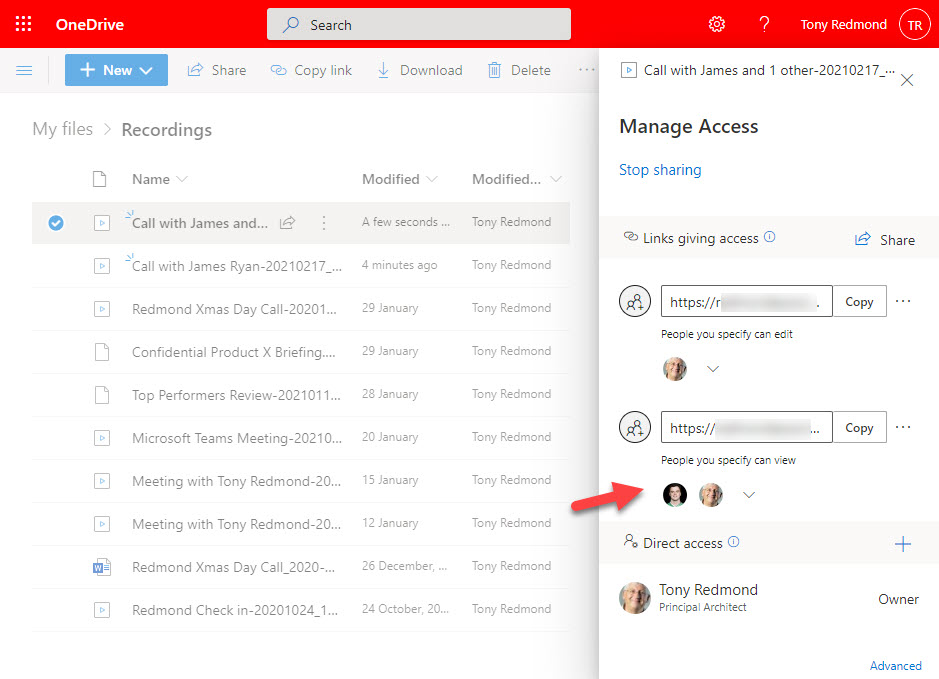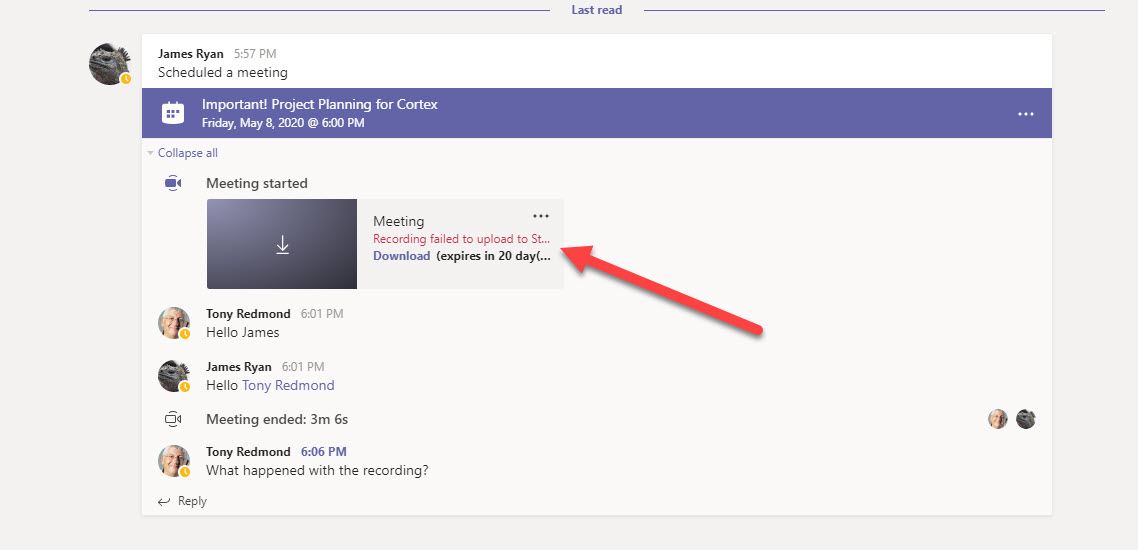SharePoint Online has a new block download file policy that stops users from downloading Teams meeting recordings. The policy applies to all sites and OneDrive for Business accounts in the tenant and is due to be part of the feature set covered by the Syntex-SharePoint Advanced Management license.
Whiteboard is the latest Teams-enabled app to use OneDrive for Business for its storage. It’s unsurprising and it’s a trend likely to continue, and it creates an administrative challenge in terms of how to handle deleted Microsoft 365 user accounts. The suggested approach of having a designated user review the information and retrieve what’s important is OK for documents but doesn’t work for app-linked content. Retention policies are a better option.
A new tweak to the sharing link dialog used by OneDrive for Business, SharePoint Online, and other Microsoft 365 workloads block downloads of video and audio files by default. This is probably what you want to happen as, unlike Office documents, when you share a video or audio file, it’s likely to be final content ready to be consumed rather than being worked on.
Teams meeting recordings can contain a lot of confidential information. It’s a quick and easy task to create a Data Loss Prevention (DLP) policy to stop people sharing these files externally, In this post, we show just how simple the required policy is, and just how effective it is at stopping external sharing.
Adding the ability to search for spoken text in Teams meeting recordings is just one of the new features added after Microsoft moved storage for meeting recordings to OneDrive for Business. A new video viewer and support for 27 additional languages (some different variants of a base language) are also important developments. In this article, we explore how Exchange Online captures the text spoken in Teams meetings, how OneDrive for Business links the text with the video, and how Search can find spoken text from the transcripts.
In September Microsoft will introduce a new auto-expiration feature for Teams meeting recordings stored in OneDrive for Business and SharePoint Online. By default, recordings will be moved to the recycle bin 60 days after creation (30 days for users with Office 365 A1 licenses). Tenants can control the default expiration period using Teams meeting policies while users can override expiration for individual files. And if you use retention policies to control Teams meeting recordings, their instructions take precedence over auto-expiration.
After writing about auto-label policies for Teams meeting recordings, we were asked about how to track the creation of the recordings. The key to be able to report the data us events in the Office 365 audit log. Once you know where to look, it’s easy to find the audit records and extract data about the creation of Teams meeting recordings.
Auto-label policies are a good way to assign retention labels to important files stored in SharePoint Online and OneDrive for Business. The big problem is tracking the progress of auto-labeling. In this article, we explore how to use events logged in the Office 365 audit log to figure out what files are labeled and how long it takes the auto-label policies to process the files. The example explored here is an auto-label policy for Teams meeting recordings.
Teams meeting organizers will soon be able to configure an option to start recording when the meeting starts. The option must be set for each meeting and there doesn’t seem to be an available method to preconfigure recordings for all meetings through a policy or programmatically. The new option is useful, if you remember to set it.
Teams meeting recordings are now accumulating as MP4 files in OneDrive for Business and SharePoint Online. If you have Office 365 E5 licenses, you can use an auto-label policy to remove recordings after a set period. If you don’t have those licenses and need to remove recordings, you’ll have to come up with another plan, maybe after tracking the creation of recordings through the Office 365 audit log.
A report saying that Teams would record every meeting automatically caused some concern, but it’s untrue. Instead, ISV solutions are available to allow companies which need to record meetings to create compliance policies to assign to specific users so that their meetings are recorded to meet legal or regulatory requirements. It would be nice to be able to update meeting options so that organizers could opt for automatic recording of certain meetings. Maybe that’s what Microsoft meant when they responded to a User Voice request. No doubt, time will tell.
OneDrive for Business now stores Teams meeting recordings. You can protect files with sensitivity labels, but does this have any side effects for Teams? As it turns out, it does because the protective wrapper which encrypts the recording breaks the link to Teams. This might not be important if you need to protect a confidential recording and restrict access to a known set of users, but it’s something to consider before applying any labels.
Microsoft has announced that recordings of Teams meetings stored in OneDrive for Business will be blocked for download by anyone except the owner. The change will roll out in mid-April and should be complete by mid-June. Microsoft’s post draws attention to the fact that you shouldn’t use channel meetings to discuss confidential topics. It’s all to do with the Microsoft 365 Groups membership model.
The Teams meeting recap feature highlights some of the important resources which can be generated for meetings. The recording, transcript, and attendance report are displayed under the Details tab for meetings accessed through the Teams calendar app.
Storage for videos stored in the new Stream will be charged against SharePoint Online and OneDrive for Business accounts. This shouldn’t make much difference for Teams recordings, as there’s plenty of storage available for OneDrive accounts. You can increase the default amount to 5 TB in enterprise tenants, and that should be enough for even the most copious of Teams meeting recorders.
In mid-March 2021 Microsoft will switch control over Teams 1:1 meeting recording from meeting to calling policies. By default, this stops users recording 1:1 meetings, meaning that tenant admins will have to update the default calling policy and any custom calling policy to allow recordings to continue. Of course, you might think it a bad idea to allow people to record 1:1 calls, in which case you don’t need to do anything.
Teams gives Office 365 tenants the option to store meeting recordings in Stream or OneDrive for Business (including SharePoint Online). Now configurable through Teams meeting policies, new meeting recordings are dealt with like any other file, meaning that you can share recordings, apply labels, update metadata, and so on.
It’s very convenient to be able to record a Teams meeting and have the recording processed and stored in Stream. But what happens when the recording fails to be processed? Usually it’s because the account that starts the recording (the owner) doesn’t have a Stream license. Fortunately, the situation is easily rescued.
In a surprise development, Microsoft announced that recording of Teams 1:1 calls is now available. Some limitations are present and the feature seems rushed, but perhaps this is because people working at home on confidential transactions need the feature, In any case, record away!
In mid-February, Microsoft will roll out a change to allow Office 365 tenants in regions where the Teams and Stream services are not co-located to record Teams meetings for the first time. This might be good news for you, but it might also pose a data sovereignty issue because once you start using Stream in another region, that’s where the recordings will stay.

















